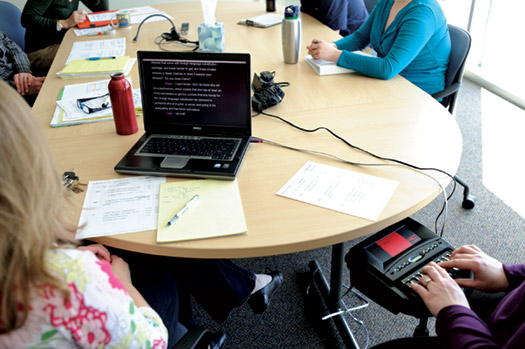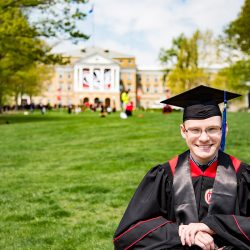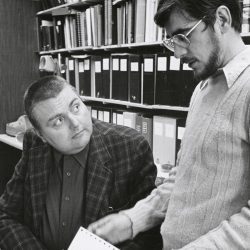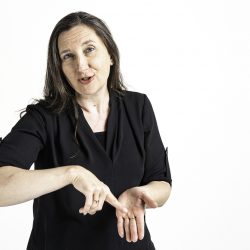Badgers, All
The McBurney Center fully integrates those with disabilities into campus life.

During a meeting at the McBurney Center, comments appear as text on a laptop computer as a stenographer captures the discussion for a staff member who has a hearing impairment. The center has been at the forefront nationally in providing equal access to education for those with disabilities. Photo: Jeff Miller
How do you hear a chemistry lecture if you’re deaf? How do you read a history textbook when the words look all jumbled up? And most important, can you get to the Rathskeller in a wheelchair?
Since 1977, the UW’s McBurney Disability Resource Center has shown students, families, the campus community, and campuses around the country how to provide equal access to education for people with disabilities.
Today, the McBurney Center is newly situated in a custom-designed space at 702 West Johnson Street, providing students with a greater variety of services than ever before. Private support has played a pivotal role. It’s a story Blair Mathews ’53, MS’54 enjoys telling.
In the mid-1970s, Mathews served as assistant dean of students. As his work put him in contact with high school counselors and staff at the Wisconsin Department of Public Instruction, he became more aware of students with disabilities — and just how difficult it was for them to attend UW–Madison. He spoke to then-Dean of Students Paul Ginsberg ’52 about making the university more manageable for disabled students.
“Paul said, ‘Do it!’ ” Mathews remembers. Although Mathews had no staff and no budget, he found a potential office location in Bascom Hall, a central location close to parking. The space, however, belonged to the School of Business. Mathews approached James Graaskamp, a UW real estate professor who was quadriplegic and an advocate for people with disabilities.
He got the space.
“I had a ragtag group of rehab-psychology graduate students prepared to help,” Mathews says, “but I needed a campus committee to get things done. Jim was the chair of that committee. Then, of course, I needed money.”
Graaskamp knew where to turn.
Despite a diving accident that paralyzed him at age sixteen, Mike McBurney ’60, LLB’63 not only earned an undergraduate degree, he finished third in his Law School class. McBurney joined his father’s successful law practice and was elected assistant district attorney, but he died in 1967 before taking office. His family had established a fund in his memory. Graaskamp asked if the family would be willing to allocate the fund as seed money for a campus office to help students with learning and other disabilities. The family agreed, and the center was named to recognize the first gift, the family’s commitment, and the center’s mission to be a campus resource.
In addition to helping establish the McBurney Center, Mathews and his wife, Karen Louise Johnson Mathews MA’99, also established a scholarship to honor Trey Duffy, the center’s second director. Recently renamed the Wisconsin Experience Accessibility Scholarship, the fund’s goal is to encourage and help students with disabilities to develop their own special talents and fully participate in the Wisconsin Experience.
The McBurney Center, which is part of the Division of Student Life, is a welcoming community and a resource for students with ADHD; deafness and hearing problems; learning disabilities; low vision and blindness; mobility, systemic, psychiatric, or health-related disabilities; and traumatic brain injury. The center’s state-of-the-art design, its energy, and the activity of students just being students — and proud Badgers — are constant reminders that disability is only a fact of life, not a way of life.
For more information, visit online.
Published in the Summer 2011 issue



Comments
No comments posted yet.